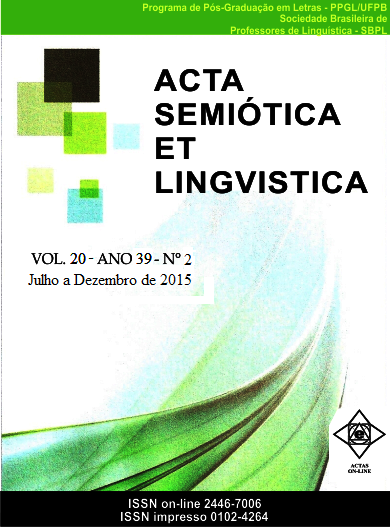O COMPORTAMENTO LINGUÍSTICO NO NOME CARA NO PORTUGUÊS BRASILEIRO
Resumo
: O objetivo deste artigo é analisar o comportamento linguístico do nome cara no português brasileiro. São observados aspectos lexicais, gramaticais, semânticos e sociolinguísticos (GROSS, 2009; HASPELMATH, 1997; MILANEZ, 1982), partindo-se da hipótese de que essa unidade linguística compartilha uma série de traços com outros nomes gerais (AMARAL e RAMOS, 2014; KOCH e OSTERREICHER, 2007; MIHATSCH, 2006). Como corpus de análise, são usados dados de língua oral presentes em entrevistas sociolinguísticas. A análise revela que, embora a unidade lexical cara não possua todas as propriedades de um nome geral prototípico como pessoa, seu emprego na língua oral o torna um bom candidato para ser incluído nessa categoria.
Palavras-chave: nomes gerais; cara; português falado.
The aim of this article is to analyze the linguistic behavior of the noun cara (guy) in Brazilian Portuguese. Lexical, grammatical, semantic and sociolinguistic aspects are observed (GROSS, 2009; HASPELMATH, 1997; MILANEZ, 1982), based on the hypothesis that this linguistic unit shares a number of traits with other general nouns (AMARAL e RAMOS, 2014; KOCH e OSTERREICHER, 2007; MIHATSCH, 2006). Spoken language data collected in sociolinguistic interviews are used as an analysis corpus. The research reveals that, although cara doesn´t present all the properties of a prototypical general noun as pessoa (person) does, its usage in oral language makes it possible to be included in this category.
Keywords: general nouns; cara; spoken Portuguese language.
Downloads
Downloads
Publicado
Edição
Seção
Licença
Declaração de Direito Autoral
Os artigos submetidos a revista Acta Semiotica et Lingvistica estão licenciados conforme CC BY. Para mais informações sobre essa forma de licenciamento, consulte: http://creativecommons.org/licenses/by/4.0
A disponibilização é gratuita na Internet, para que os usuários possam ler, fazer download, copiar, distribuir, imprimir, pesquisar ou referenciar o texto integral dos documentos, processá-los para indexação, utilizá-los como dados de entrada de programas para softwares, ou usá-los para qualquer outro propósito legal, sem barreira financeira, legal ou técnica.
1) Autores mantém os direitos autorais e concedem à revista o direito de primeira publicação, com o trabalho simultaneamente licenciado sob a Licença Creative Commons Attribution que permite o compartilhamento do trabalho com reconhecimento da autoria e publicação inicial nesta revista.
2) Autores têm autorização para assumir contratos adicionais separadamente, para distribuição não-exclusiva da versão do trabalho publicada nesta revista (ex.: publicar em repositório institucional ou como capítulo de livro), com reconhecimento de autoria e publicação inicial nesta revista.
3) Autores têm permissão para publicar e distribuir seu trabalho online (ex.: em repositórios institucionais ou na sua página pessoal) a qualquer ponto antes ou durante o processo editorial, já que isso pode gerar alterações produtivas, bem como aumentar o impacto e a citação do trabalho publicado.


